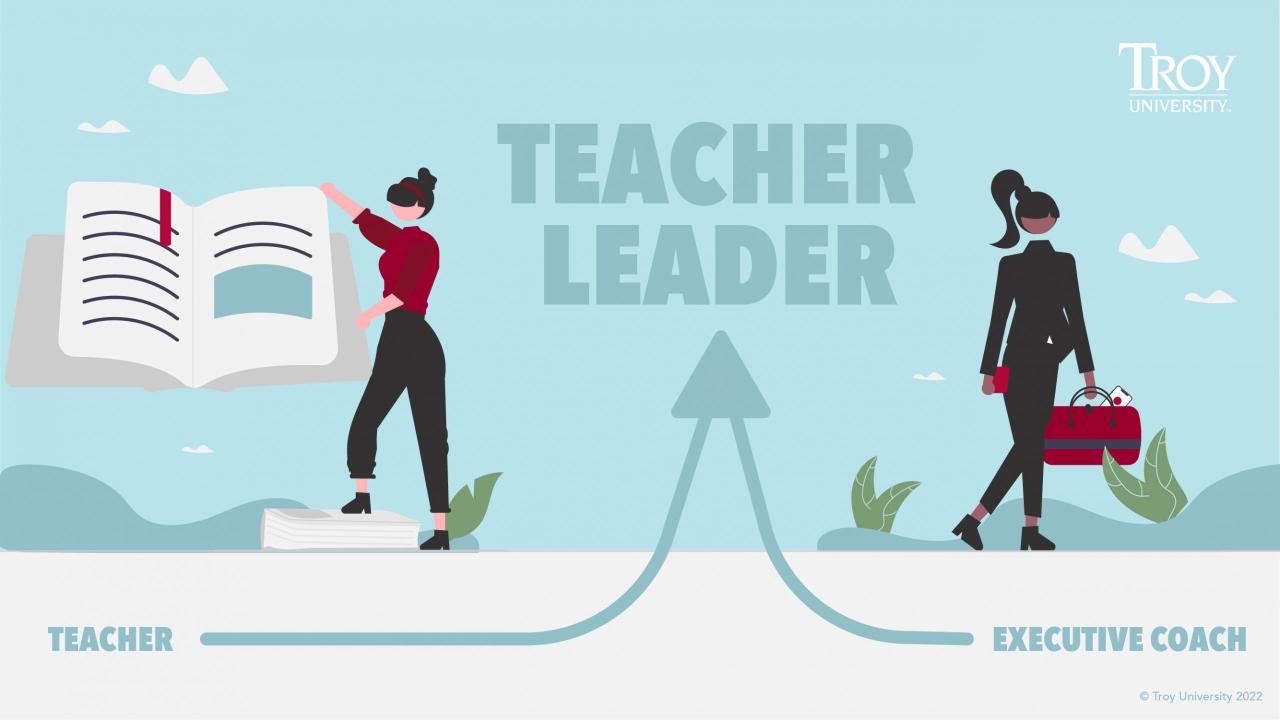Masters in Teacher Leadership is an advanced degree program designed to empower educators with the knowledge, skills, and leadership qualities necessary to transform educational landscapes. This program provides a comprehensive foundation for aspiring leaders who seek to drive innovation, inspire collaboration, and create equitable learning environments.
Through a blend of theoretical and practical coursework, graduates of Masters in Teacher Leadership programs gain expertise in curriculum development, assessment, collaboration, ethical decision-making, and the latest trends in education. These professionals are equipped to assume leadership roles in schools, districts, and educational organizations, shaping the future of education and empowering students to reach their full potential.
Definition and Overview of Master’s in Teacher Leadership

A Master’s in Teacher Leadership (MTL) program equips educators with advanced knowledge and skills to excel in leadership roles within educational settings.
The program aims to develop:
- Expertise in instructional leadership, curriculum design, and educational technology.
- Leadership skills in managing teams, fostering collaboration, and creating positive school cultures.
li>Understanding of educational policy, finance, and law.
Roles and Responsibilities of Graduates, Masters in teacher leadership
Graduates of MTL programs may pursue roles such as:
- Instructional Coaches
- Curriculum Coordinators
- Assistant Principals
- Principals
- Educational Consultants
Program Structure and Curriculum

A Master’s in Teacher Leadership program typically spans 30-36 credit hours and can be completed in 1-2 years of full-time study or 2-3 years of part-time study. The program structure often includes a mix of core courses, electives, and a culminating project or thesis.The core courses provide a foundation in the principles and practices of teacher leadership, including:
- Educational Leadership
- Curriculum and Instruction
- Assessment and Evaluation
- School Law and Policy
- Educational Research
Electives allow students to tailor their program to their specific interests and career goals. Common electives include:
- Technology in Education
- Special Education
- Early Childhood Education
- Literacy Education
- School Counseling
The program typically strikes a balance between theoretical and practical components. Theoretical courses provide students with a deep understanding of the principles and research underlying teacher leadership. Practical components, such as internships, field experiences, and action research projects, allow students to apply their knowledge and skills in real-world settings.
Benefits and Career Advancement
A Master’s in Teacher Leadership offers numerous advantages for career progression in the field of education. It enhances professional skills, expands knowledge, and opens doors to leadership roles within schools and districts.
Salary Increases
Graduates with a Master’s in Teacher Leadership often experience significant salary increases. According to the National Education Association, teachers with a master’s degree earn an average of 15% more than those with only a bachelor’s degree. This translates to an additional $5,000-$10,000 per year in potential earnings.
Promotion Opportunities
The degree also qualifies individuals for promotion to leadership positions within schools, such as assistant principal, principal, or curriculum coordinator. These roles involve greater responsibilities, decision-making authority, and earning potential.
Successful Career Paths
Individuals with a Master’s in Teacher Leadership have pursued successful careers in various educational settings. Some examples include:
- Assistant Principal at a large urban high school
- Principal of a small rural elementary school
- Curriculum Coordinator for a large school district
- Instructional Coach for a non-profit educational organization
- Higher Education Administrator at a local university
Leadership Skills and Development

A Master’s in Teacher Leadership program empowers educators with a comprehensive suite of leadership skills. These skills are instrumental in navigating the complexities of educational settings and driving positive change within schools and communities.
Masters in teacher leadership programs equip educators with advanced skills to excel in leadership roles within educational settings. If you’re looking to broaden your horizons, consider pursuing a master of leadership online. This program provides a comprehensive understanding of leadership principles and practices, enhancing your ability to effectively lead and inspire students, colleagues, and the school community.
The program curriculum emphasizes:
- Visionary leadership: Developing a clear vision for the future of education and inspiring others to work towards it.
- Strategic planning: Creating and implementing plans that align with the school’s mission and goals.
- Effective communication: Communicating effectively with students, parents, colleagues, and the community.
- Data-driven decision-making: Using data to inform decision-making and improve student outcomes.
- Problem-solving and conflict resolution: Identifying and addressing problems effectively, and resolving conflicts fairly and equitably.
- Ethical leadership: Acting with integrity and making decisions that are in the best interests of students and the school community.
li>Collaboration and teamwork: Building strong relationships and working collaboratively with others to achieve shared goals.
These leadership skills are essential for educators who aspire to make a meaningful impact in education. By honing these skills, teachers can effectively lead their classrooms, collaborate with colleagues, and contribute to the overall success of their schools.
al Design and Curriculum Development
al design plays a pivotal role in teacher leadership by empowering educators to create and implement engaging and effective learning experiences. It involves the systematic planning, development, and implementation of al environments that promote student learning and growth.
A master’s in teacher leadership prepares you to lead and manage educational institutions. If you’re interested in pursuing a higher degree, consider a phd in educational leadership and management. This advanced degree provides specialized knowledge and skills in educational leadership, policy, and research.
With a master’s in teacher leadership and a phd in educational leadership and management, you’ll be well-equipped to make a significant impact on the education system.
Effective curriculum development adheres to several principles:
- Alignment with Standards:Curriculum aligns with established educational standards and learning objectives.
- Student-Centered:Focuses on student needs, interests, and learning styles.
- Relevance and Engagement:Makes learning meaningful and applicable to students’ lives.
- Differentiation:Provides multiple pathways for students to access and engage with content.
- Assessment-Driven:Regularly assesses student progress to inform instruction and make adjustments.
Innovative al strategies include:
- Blended Learning:Combines online and face-to-face instruction.
- Personalized Learning:Tailors instruction to individual student needs.
- Gamification:Uses game elements to enhance engagement and motivation.
- Project-Based Learning:Focuses on real-world projects that promote problem-solving and collaboration.
- Adaptive Learning:Uses technology to adjust content and difficulty based on student progress.
Curriculum models include:
- Subject-Centered:Organized around traditional academic disciplines.
- Thematic:Integrates multiple disciplines around a central theme.
- Problem-Based:Focuses on solving real-world problems.
- Inquiry-Based:Emphasizes student questioning and exploration.
- Constructivist:Views learning as an active process of constructing knowledge.
Assessment and Evaluation

Assessment and evaluation play a pivotal role in teacher leadership, empowering leaders to monitor progress, identify areas for improvement, and make informed decisions to enhance teaching and learning outcomes.
Assessment encompasses a wide range of methods used to gather information about student learning, teacher performance, and program effectiveness. These methods provide valuable insights into the impact of teaching practices, identify areas where students need additional support, and measure the overall success of educational initiatives.
Types of Assessment Methods
- Formative Assessments:Ongoing assessments conducted during the teaching process to provide feedback and identify areas for improvement.
- Summative Assessments:Assessments conducted at the end of a unit or course to measure student learning outcomes and evaluate the effectiveness of teaching methods.
- Diagnostic Assessments:Assessments used to identify students’ strengths and weaknesses, allowing teachers to tailor instruction to meet individual needs.
- Performance-Based Assessments:Assessments that require students to demonstrate their skills and knowledge through hands-on activities, projects, or presentations.
Effective Assessment Practices
To ensure effective assessment, it’s essential to:
- Align assessments with learning objectives:Assessments should accurately measure the skills and knowledge students are expected to learn.
- Provide clear instructions:Students should clearly understand the purpose of the assessment and what is expected of them.
- Use a variety of assessment methods:Different methods provide a more comprehensive view of student learning.
- Provide timely and specific feedback:Feedback should be given promptly and should help students understand their strengths and areas for growth.
- Use assessment data to inform instruction:Assessment results should be used to make informed decisions about teaching strategies and curriculum.
Collaboration and Partnerships
Collaboration and partnerships are essential for effective teacher leadership. By working together with stakeholders, teachers can share knowledge, resources, and ideas to improve student learning.
There are many different ways to build effective partnerships with stakeholders. Some common strategies include:
Communicating Effectively
- Establishing open lines of communication with parents, students, and other teachers.
- Actively listening to stakeholders’ concerns and perspectives.
- Providing regular updates on student progress and school activities.
Building Relationships
- Getting to know stakeholders on a personal level.
- Attending school events and participating in community activities.
- Volunteering in the community.
Shared Goals and Objectives
- Developing shared goals and objectives for student learning.
- Working together to create a positive and supportive learning environment.
- Celebrating successes and learning from challenges.
When teachers collaborate and partner with stakeholders, they can create a more positive and productive learning environment for students. Here are some examples of successful collaborations that have improved educational outcomes:
Example 1
- A teacher partnered with parents to create a homework club for students who needed extra support.
- The club met once a week after school, and parents volunteered to help students with their homework.
- As a result of the club, students’ homework completion rates increased, and their grades improved.
Example 2
- A teacher partnered with a local business to create a mentorship program for students who were interested in pursuing a career in the business field.
- Students met with mentors once a month to learn about the business world and develop professional skills.
- As a result of the program, students were more prepared for college and careers, and they had a better understanding of the business world.
Ethical and Legal Considerations

Ethical and legal considerations are paramount in teacher leadership. Understanding the ethical principles that guide decision-making in educational settings is essential for effective leadership. This section explores the ethical dilemmas that teacher leaders may encounter and provides potential resolutions.
Masters in teacher leadership programs equip educators with the skills to effectively lead and manage educational institutions. For those seeking to further advance their leadership capabilities, phd programs in leadership provide an in-depth exploration of leadership theories, research, and best practices.
By pursuing a PhD in leadership, educators can enhance their understanding of leadership and its impact on teaching and learning, ultimately strengthening their ability to drive positive change within the educational system.
Ethical Principles in Educational Settings
- Integrity:Maintaining honesty, trustworthiness, and fairness in all actions.
- Objectivity:Making decisions based on facts and evidence, free from personal bias.
- Confidentiality:Protecting the privacy of students, staff, and families.
- Respect:Treating all individuals with dignity and valuing their perspectives.
li> Equity:Ensuring that all students have equal opportunities and access to resources.
Ethical Dilemmas and Potential Resolutions
Teacher leaders may face ethical dilemmas, such as:
- Conflicting Loyalties:Balancing the needs of students, staff, and the school.
- Grade Inflation:The temptation to inflate grades to avoid conflict or boost student morale.
- Student Discipline:Deciding on fair and appropriate disciplinary measures.
Potential resolutions include:
- Seeking guidance from ethical frameworks and professional codes of conduct.
- Consulting with colleagues and mentors for diverse perspectives.
- Documenting decisions and the rationale behind them for transparency.
Current Trends and Future Directions: Masters In Teacher Leadership

The field of teacher leadership is constantly evolving, with new trends and innovations emerging all the time. These trends are being driven by a number of factors, including the changing needs of students, the increasing use of technology in education, and the growing emphasis on data-driven decision-making.
One of the most significant trends in teacher leadership is the increasing focus on distributed leadership. This model of leadership shares power and decision-making among a team of educators, rather than relying on a single individual. Distributed leadership can help to improve student outcomes by allowing teachers to share their expertise and work together to create a more supportive and effective learning environment.
Another important trend is the growing use of technology in teacher leadership. Technology can be used to support teachers in a variety of ways, including:
- Collecting and analyzing data to improve instruction
- Providing professional development opportunities
- Facilitating collaboration among teachers
As technology continues to evolve, it is likely that we will see even more innovative uses for it in teacher leadership.
The future of teacher leadership is bright. As the field continues to evolve, we can expect to see even more innovative and effective ways to support teachers and improve student outcomes.
Ending Remarks
In conclusion, Masters in Teacher Leadership is an essential investment for educators who aspire to lead and transform the educational landscape. By embracing the principles of effective leadership, collaboration, and innovation, graduates of this program become catalysts for change, empowering students and shaping a brighter future for education.
Popular Questions
What are the career prospects for graduates of Masters in Teacher Leadership programs?
Graduates can pursue a wide range of leadership roles in education, including school principals, district administrators, curriculum coordinators, and educational consultants.
What are the key skills developed through a Masters in Teacher Leadership program?
Key skills include strategic planning, data-driven decision-making, effective communication, conflict resolution, and a deep understanding of educational best practices.
How does a Masters in Teacher Leadership program balance theoretical and practical components?
Programs typically combine coursework with hands-on experiences such as internships, practicums, and research projects, ensuring that graduates are well-prepared for real-world leadership challenges.